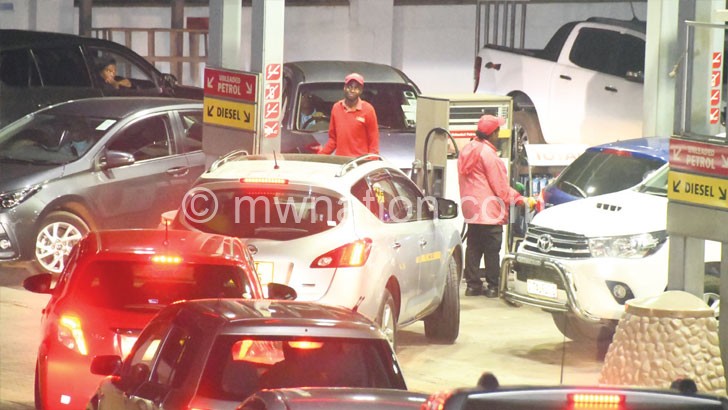Christmas blues Fuel price up 28%
Fuel prices last night rose for the first time in 12 months, climbing by an average of 28 percent. In a statement signed by board chairperson Leonard Chikadya, Malawi Energy Regulatory Authority (Mera) said
petrol will effective today sell at 20.87 percent more from K690.50 per litre (l) to K834.60/l. Authority (Mera) said
On the other hand, diesel—predominantly used for transporting goods in a country that heavily depends on road transport and currently being used to generate about 60 megawatts of the country’s electricity—is up 24.31 percent from K664.80 to K826.40. Paraffin has jumped from K441.70 to K613.20, representing 38.83 percent hike.
Briefing journalists in Lilongwe last evening, Mera spokesperson Fitina Khonje attributed the increase to the rise in fuel landing costs and the depreciation of the kwacha by 3.37 percent since May this year.
The last time fuel prices rose was in November 2019, but after that they progressively dropped until yesterday.

The energy price shock— coming at a time the Malawi economy is on the brink of a recession on the back of the devastating impact of the Covid-19 pandemic—is set to trigger increases in goods and services, erode more jobs and worsen poverty.
And arriving at the beginning of the seasonal lean period—when foreign currency is in short supply— this hike could be the first among many ahead as depreciation of the kwacha at a rate of more than five percent either way sets off fuel price movements.
The kwacha is already in a downward spiral as forex dwindles, forcing the now interventionist Reserve Bank of Malawi to burn its drying up reserves to prop up a local currency under siege.
But the central bank’s move is unsustainable given the country’s sharply declining trade activities in the face of Covid-19, with the trade deficit now at over K1.1 trillion.
The implementation of the Affordable Input Programme—four times the predecessor Farm Input Subsidy Programme—has meant more forex outlays than normal, exerting more pressure on the local unit.
“The spillover effects of the Covid-19 pandemic have led to lower than expected export earnings amidst the growing demand for Covid-19 related imports and seasonal agriculture materials,” notes Nico Asset Managers in its November monthly analysis.
Thus, while the RBM’s moves have so far limited the kwacha’s erosion to just 3.4 percent during Mera’s review period and to soften the fuel price damage, the same may not be easy to pull in the coming months.
Landed costs are also unlikely to retreat soon as the supply chain disruptions and logistical nightmares that Covid-19 has brought are unlikely to go away any time soon even as vaccine distribution starts.
Some commentators expressed worries at the fuel price hike news last night, saying households and organisations—including the real sector—may not cope with the strain on operational budgets that the increases will bring.
Economics Association of Malawi (Ecama) executive director Kettie Nyasulu said the fuel pump price increase is detrimental to citizens and will negatively affect the economy at both micro and macro levels. director Kettie Nyasulu said
She said at the micro level, households will struggle to cope with the increased prices of goods and services triggered by the price increase, thereby affecting their budgets.
At the macro level, Nyasulu said the cost of production for manufacturers will rise due to fuel price hike largely because transport accounts for the bulk of transportation costs of goods and services.
She said the impact will trigger inflation in the economy at the same time slow down the anticipated economic growth.
Said Nyasulu: “At household level, it means people’s transport costs will go up and eat the large portion of people’s budget. This notwithstanding, the impact of Covid-19 pandemic is still impacting the economy.”
She said even agricultural inputs will rise and affect farmers because transportation of the supplies relies on fuel.
In his immediate reaction to the price hike last evening, Consumers Association of Malawi (Cama) executive director John Kapito described the fuel price increase as “a sad development”.
He faulted the new Tonse Alliance administration led by President Lazarus Chakwera for delaying to appoint the board of directors of State-owned companies, including Mera—a critical player in regulating fuel prices.
Kapito said: “If prices were revised on a monthly basis, the impact could have been minimised, but they [government] kept everything on the table.
“This increase in the price of petroleum products will trigger huge increases in prices of goods and services. We will see demand for salary increases. This will sadly dampen the Christmas and New Year’s Day festive season mood for everyone.”
But Mera’s Khonje said the energy regulator appreciates that this is the lean period when Malawians are facing hard economic times, but they could not have waited because the increase was long overdue as the Fuel Price Stabilisation Fund that cushions price could no longer cope.
Said Khonje: “Over time, fuel prices have been increasing globally since May when we had a review. This has been eating into the [price stabilisation] fund.
“The prices were lower in May because there was not much economic activity globally due to the lockdowns [to prevent coronavirus spread]. But business has been picking up as countries have been opening up to business.





